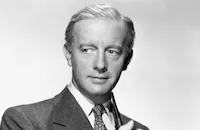Safari

Brief Synopsis
Cast & Crew
Terence Young
Victor Mature
Janet Leigh
John Justin
Roland Culver
Liam Redmond
Film Details
Technical Specs

Synopsis
While leading an elephant hunting expedition in Kenya, Ken Dufield, a "Great White Hunter," learns of a Mau Mau uprising near his farm in Nairobi. Rushing back to Nairobi, Ken finds his home in ashes and his young son murdered by Jeroge, a Mau Mau general who infiltrated the Dufield home by posing as a house boy. When Ken vows to avenge his son's murder, the provincial governor revokes his hunter's license until the police can capture Jeroge. Soon after, Sir Vincent Brampton, a ruthless English lord, arrives in Nairobi with his fiancée, a former showgirl named Linda, and his aide, Brian Sinden. Vincent is obsessed with killing the man-eating lion known as Atari, and upon learning that the hunter he chose to lead the expedition is unavailable, he launches into a tirade directed at Brian. When Roy Shaw, an organizer of hunting expeditions, suggests that Ken lead Vincent's party, Vincent coerces the governor into reinstating the hunter's license. After hiring a contingent of helpers, including Jerusalem, a trumpet playing cook, Odongo, a young boy who begs to go along, and the reliable Kakora, the hunting party sets out into Mau Mau territory. When they set up camp, Linda tries to strike up a conversation with the taciturn Ken, who rebuffs her overtures. Linda then admits that she has agreed to marry Vincent solely for his money and position. That night, Roy notifies Ken over the short-wave radio that one of his safari boys has taken the Mau Mau oath. Ken then contacts the Masai, an enemy of the Mau Mau, who inform him that Jeroge is in the vicinity. Upon discovering that Jeroge is but one hour away, Ken takes off after him with Kakora, thus allowing Jackson, the Mau Mau spy in camp, to steal Brian's rifle. Jackson delivers the rifle to Jeroge, who lies in wait for Ken. With Kakora's help, Ken fends off Jeroge's attack and returns to camp, where Vincent humiliates Brian for the loss of his rifle. Softening toward Linda, Ken goes to her tent to talk and is jealously watched by Vincent. Soon after, Jackson tries to sneak back into camp, but Kakora catches him. Escaping Kakora's grasp, Jackson runs into the bush and is pursued by Ken and the others, who leave Odongo behind to protect Linda. Sneaking back to camp, Jackson attacks Linda, but is repelled by Odongo and Jerusalem, who slams him over the head with a frying pan. Just as Jackson regains his balance and is about to assault Linda again, Ken returns and shoots him. The next day, Brian remains behind with Linda as Ken and Vincent track Atari. Linda drinks to compensate for her desperate unhappiness as Vincent's consort, and after finishing a bottle, decides to jump into a rubber raft and go fishing on the treacherous river. In the brush, meanwhile, Ken and Vincent spot Atari, and although Ken warns that they are at too great a distance to bring the animal down, Vincent fires anyway, wounding the beast, who then takes cover in the jungle. Just then, Brian arrives with news that Linda is drifting dangerously down the river. As her raft approaches the rapids, Linda is catapulted from the craft into the water and trailed by a hungry crocodile. Upon reaching the river bank, Ken shoots the crocodile and pulls Linda to shore. As Kakora, Ken and Vincent resume tracking the wounded lion, an enraged rhinoceros charges from the bush and gores Kakora. After sorrowfully burying his friend, Ken denounces Vincent as being responsible for Kakora's death. Later, alone with Ken, Linda announces that she is taking her final drink to fuel her courage so that she can proclaim her love for him. Soon after, Roy radios that a contingent of Mau Mau terrorists are heading toward them. When Ken orders the safari to move out immediately, Vincent, determined to bag the lion at any cost, pops a handful of pills and then heads into the night to kill his prey. When Ken goes after him, Vincent, crazed, threatens to shoot the hunter. Just then, Atari lunges at Vincent and mauls him. After Ken shoots the beast, he carries the gravely injured Vincent back to camp. Aware that they must quickly reach the hospital in Nairobi if they are to save Vincent's life, Ken decides to take a shortcut through Mau Mau country. As the safari enters the perilous territory, Jeroge and his men, positioned in the hills above the road, shoot out their tires and then attack. After Ken peppers the terrorists with gunfire, they retreat, waiting until dark to attack once more. To save his friends, Odongo risks his life and runs off to notify the territorial police of their peril. As night falls, Ken orders the others to pull out, but the Mau Mau swoop down upon them first, blocking the road with a felled tree. As Jerusalem, Linda and Ken fire at the terrorists, Vincent raves in delirium and is fatally struck by a Mau Mau bullet. Just as Odongo and the reinforcements arrive, Jeroge wounds Ken and is about to shoot Odongo when Ken rises up and slays him. Now safe, Linda kisses Ken and Odongo merrily laughs and muses that Ken will now look after Linda.

Director

Terence Young
Cast

Victor Mature

Janet Leigh

John Justin

Roland Culver
Liam Redmond
Earl Cameron
Orlando Martins
Juma
Lionel Ngakane
Harry Quashie
Slim Harris
Cy Grant
John Wynn
Arthur Lovegrove
Estelle Brody
Christopher Warbey
John Harrison
Glyn Lawson
Frank Singuineau
Charles Hayes
Bartholomew Sketch
John Cook
Bob Isaacs
Crew
Irwin Allen
William Alwyn
William Alwyn
Anne Box
Albert R. Broccoli
Robert Buckner
Cec Cooney
Denys Coop
Elsa Fennell
Fred Ford
Michael Forlong
Henry Geddes
Michael Gordon
Fred Holland
Maisie Kelly
Tony Lower
Muir Mathieson
Ted Moore
Alan Osbiston
Nora Roberts
Paddy Roberts
Royal Philharmonic Orchestra
Elliot Scott
J. B. Smith
Gerry Turner
Max Varner
Anthony Veiller
John Wilcox
Fred Williamson
Adrian D. Worker

Photo Collections
Film Details
Technical Specs

Articles
Safari -
The movie begins with hunter Ken Duffield (Victor Mature) going off on yet another safari and leaving his son behind with his housekeeper and loyal ranch hands, including Jeroge (Earl Cameron). After his first day on safari he gets an urgent radio message that Mau Mau terrorists are in the vicinity of his home and rushes back. The housekeeper and boy take up arms against the onslaught of rebels but Jeroge, it turns out, is a Mau Mau general and kills them both. Duffield is broken and the British remove his hunting license so he can't be hired on safaris but the real reason is they don't want him going after Jeroge. Best to let the British army take care of that. Meanwhile, a wealthy British politician, Sir Vincent Brampton (Roland Culver), shows up with his showgirl fiancée, Linda (Janet Leigh), intent on using Duffield to take him on safari. Duffield tells him he can't and Brampton pulls some strings to get his license back. The safari begins but only as a pretense for Duffield to secretly hunt down Jeroge.
Safari was directed by Terence Young who would later go on to direct three early James Bond classics, including the very first Bond movie, Dr. No (1962). Watching Safari, it's easy to see why producer Broccoli would stick with Young once he got the rights to do the Bond movies. Victor Mature and Janet Leigh, brave, macho man and sleek, sexy blond, make for an early prototype of the Bond/Bond girl model. Young also excels at action and the early attack sequence is a great example. As the Mau Mau rebels close in, Young brings the camera inside the house, showing the rebels advancing through window vantage points and brief glimpses in the dark. The housekeeper and young son do their best shooting as many as they can until Jeroge is revealed, in the same frame as the young son, shooting another ranch hand which goes unnoticed by the boy as the shot is but one of many among the gunfire. When Jeroge finally approaches and kills the boy, Young wisely takes the camera off the boy and into Jeroge's face as we watch the shocking scene unfold. It's a heavy opening for an action movie but Young shoots it with just enough distance to make sure it doesn't weigh down the rest of the movie, something showing the boy die surely would have done.
The leads do a fine job as well. Victor Mature got a lot of heat for not being the world's greatest actor but, in reality, he knew his range and did a fine job in roles like this, playing both stoic heroism and embittered rage quite well. He even does a good job expressing grief, not through crying, but looking as if the world punched him the gut and left him breathless.
Janet Leigh looks as beautiful as ever and brings energy and wit to the role of gold digging showgirl. Leigh played sarcasm and cynicism well and the same world weary attitude she displays in Touch of Evil (1958),Psycho (1960), and The Manchurian Candidate (1962) is seen here, too, bringing a sharper edge to the showgirl character that another, lesser, actress might not have brought to the role. She's forced to struggle through only one silly scene when her character manages to go down a crocodile infested river in a tiny yellow raft (for no other reason than to have Victor Mature race to the rescue) but otherwise is a stronger female character than this kind of movie was used to seeing.
Earl Cameron plays Jeroge and was one of the first black actors in Britain to get respectable, non-stereotypical roles. He even teamed up with Young and Broccoli again on Thunderball (1965). As of 2014, he was still active in television and the movies.
Safari is gorgeous to look at, filmed in Technicolor Cinemascope and on location. The Kenyan landscapes are beautiful to behold and give the movie a more modern feeling since the action is clearly not happening on a set. The exciting climax, filmed at the foot of a Kenyan mountain range, and filled with attacking rebels, dug-in combatants, and a last second ride to the rescue, Calvary style, gave Terence Young good training for his later work with James Bond and ended up being one of his best action efforts and one of the best adventures of 1956.
by Greg Ferrara

Safari -
Quotes
Trivia
Notes
The working title of this film was Safari Story. The opening and closing cast credits differ slightly in order. According to a March 1956 Hollywood Reporter news item, Ned Washington was initially signed to write a song for the film. Hollywood Reporter production charts note that filming was done in London, England and in East Africa.

Miscellaneous Notes
Released in United States Summer June 1956
CinemaScope
Released in June 1956.
Released in United States Summer June 1956














